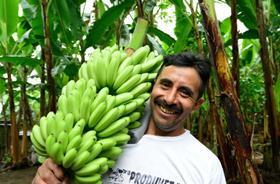
It’s not easy being a younger brother to one of the world’s most popular fruit. The baby banana variety is half the size of its relative, and a small part of global market share in the category.
But the young crop could be better poised for modern tastes as a sweeter and more transportable offering. Globally the baby banana is growing in popularity, with China now getting in on the act, but in the UK, suppliers are having a harder time making any headway.
One of the few specialists in baby banana production is exotic fruit supplier FLP, which began cultivating the variety in 1995. Its commercial director David Abuchar says the company has now created a robust industry in Ecuador, with over a hundred growers, a far cry from the six it began life with.
“FLP baby bananas are not just baby bananas,” says Abuchar. “The social and economic impact this project has had over the community we work with is exceptional. We started in 1995 with six small-scale growers and now include more than 100, which have on average three hectares. There are cases of families where three generations have been engaged in growing baby bananas for us. We’re certified Fairtrade since 2012.”
He says their specs make them a good way to get kids into fruit consumption, a particularly pressing problem in Britain, and they will only increase in popularity with the rise of healthy eating trends and marketing. “Baby bananas measure only 9-15cm against the 20-28cm of their ‘older brother’. It’s also sweeter at 27 brix when ripe against 24, and because of its size and flavour, it’s an ideal healthy snack to put in children’s lunchboxes.”
One of the key drivers of FLP’s success in exports has been its focus on the category. Rather than an afterthought, it has aimed to push through the cultivar into the mainstream.
“The difference with our babies is not only the story behind it, but the fact we’re specialists. We don’t export a single container of Cavendish. This means our focus for more than 20 years has been on how to make it better. And the results are there to be seen. This year we will export more than 300 containers. Our main market is continental Europe and since 2017 we began to export to China.”
Unsurprisingly, however, British tastes are at odds with their continental neighbours. Abuchar says the sweeter crop has yet to generate commercial interest on these isles, thanks in part to a doppelganger confusing the market.
“The UK market so far has been elusive for us and I’d say for baby bananas in general. As far as we know, there are very few shops where the product can be found.
“One of the challenges we see in the UK is that some shops sell what they call ‘small bananas’. Having normal bananas plus small bananas, it may seem too much to add a third kind to the category. But small bananas are just shorter Cavendishes, there is no difference in taste. So, we believe there is an opportunity in the UK for baby bananas. It’s tasty, it’s healthy, it’s convenient and it’s Fairtrade.”
Going forward, Abuchar says baby bananas will grow in market share, if not in stature, with his company adding an organic range to tap into residue-free trends. “Last year we started our own plantation, which is organic certified, and we are seeing more and more interest in countries like the US, Canada and South Korea.”






No comments yet